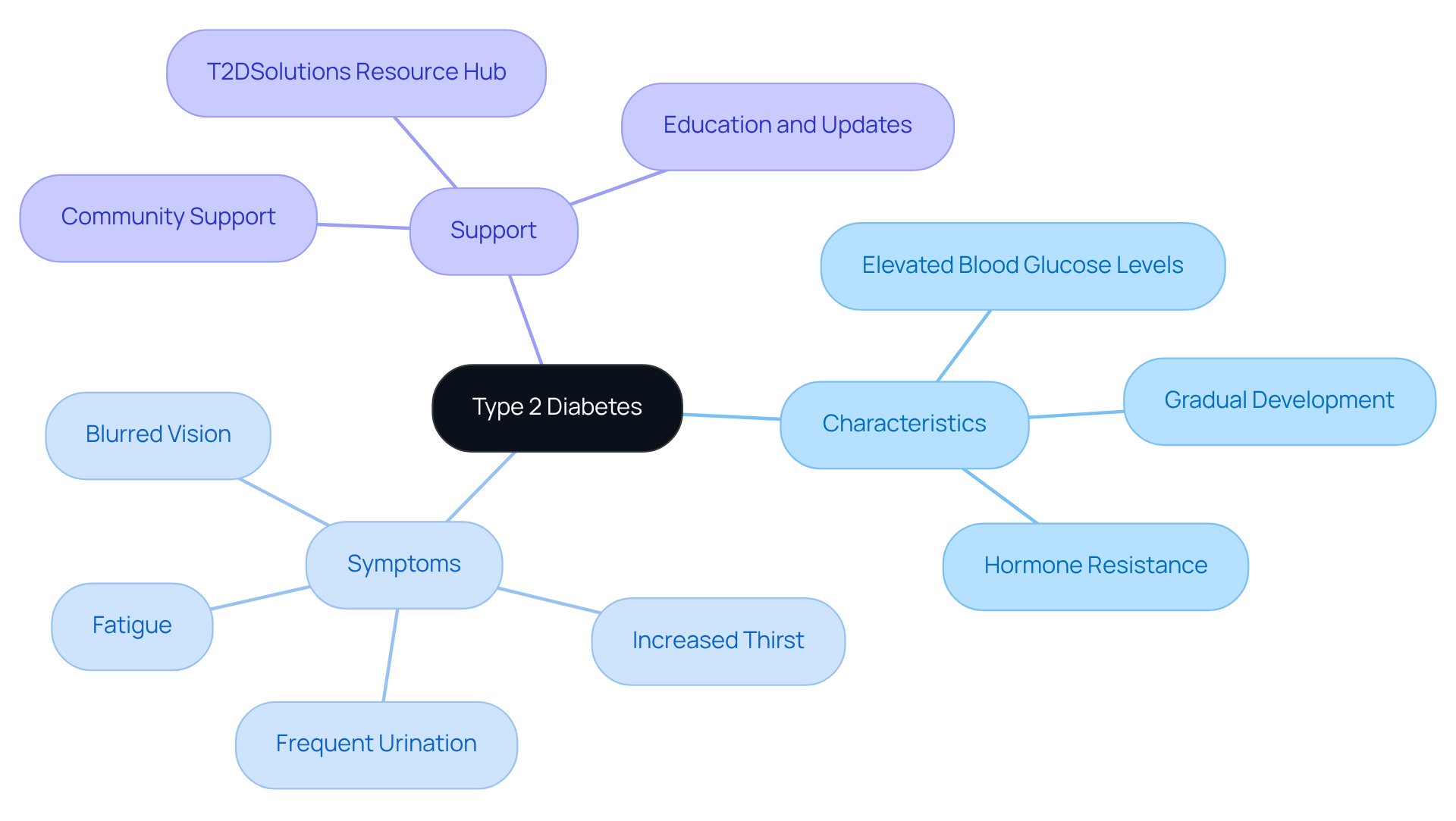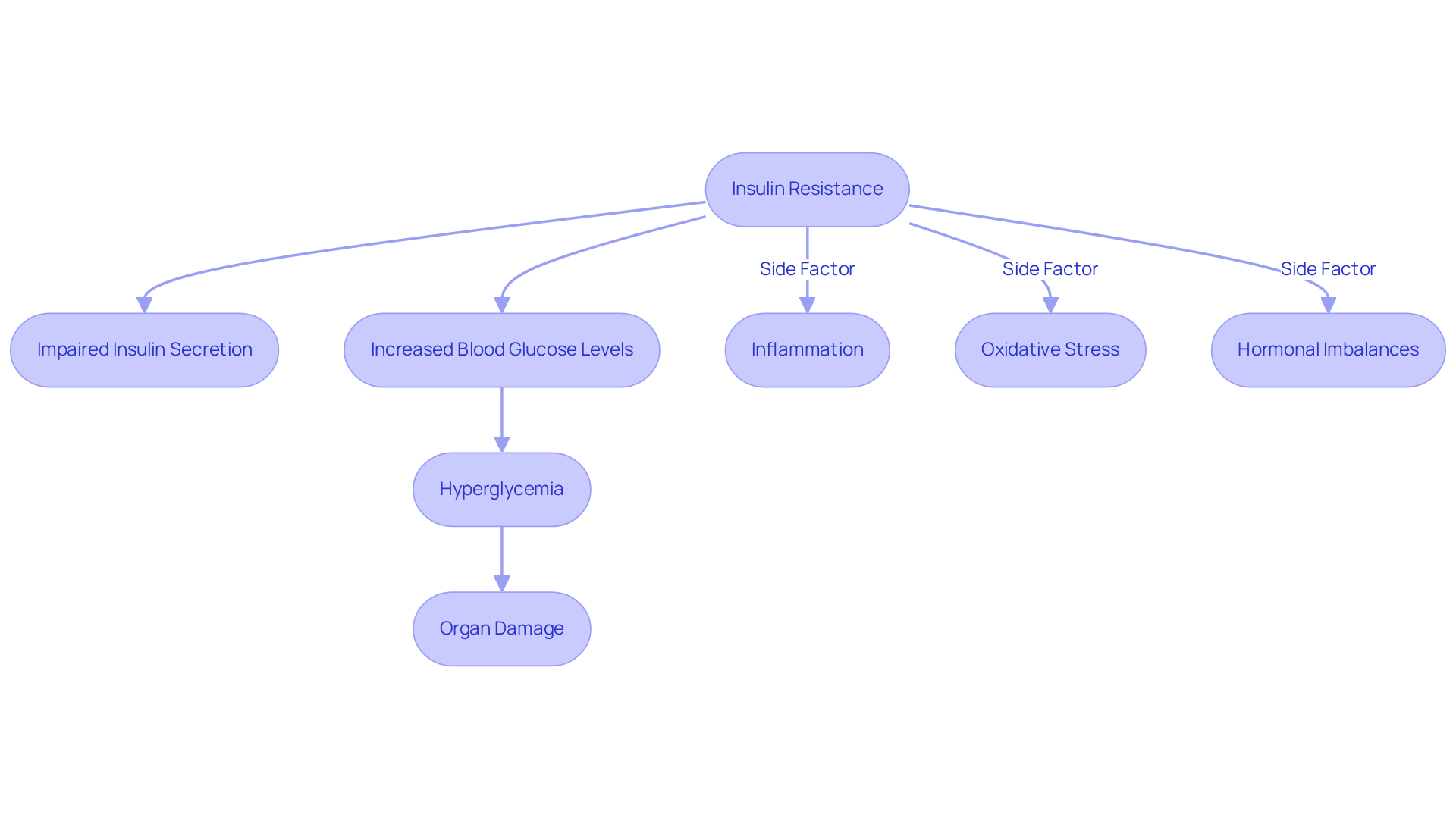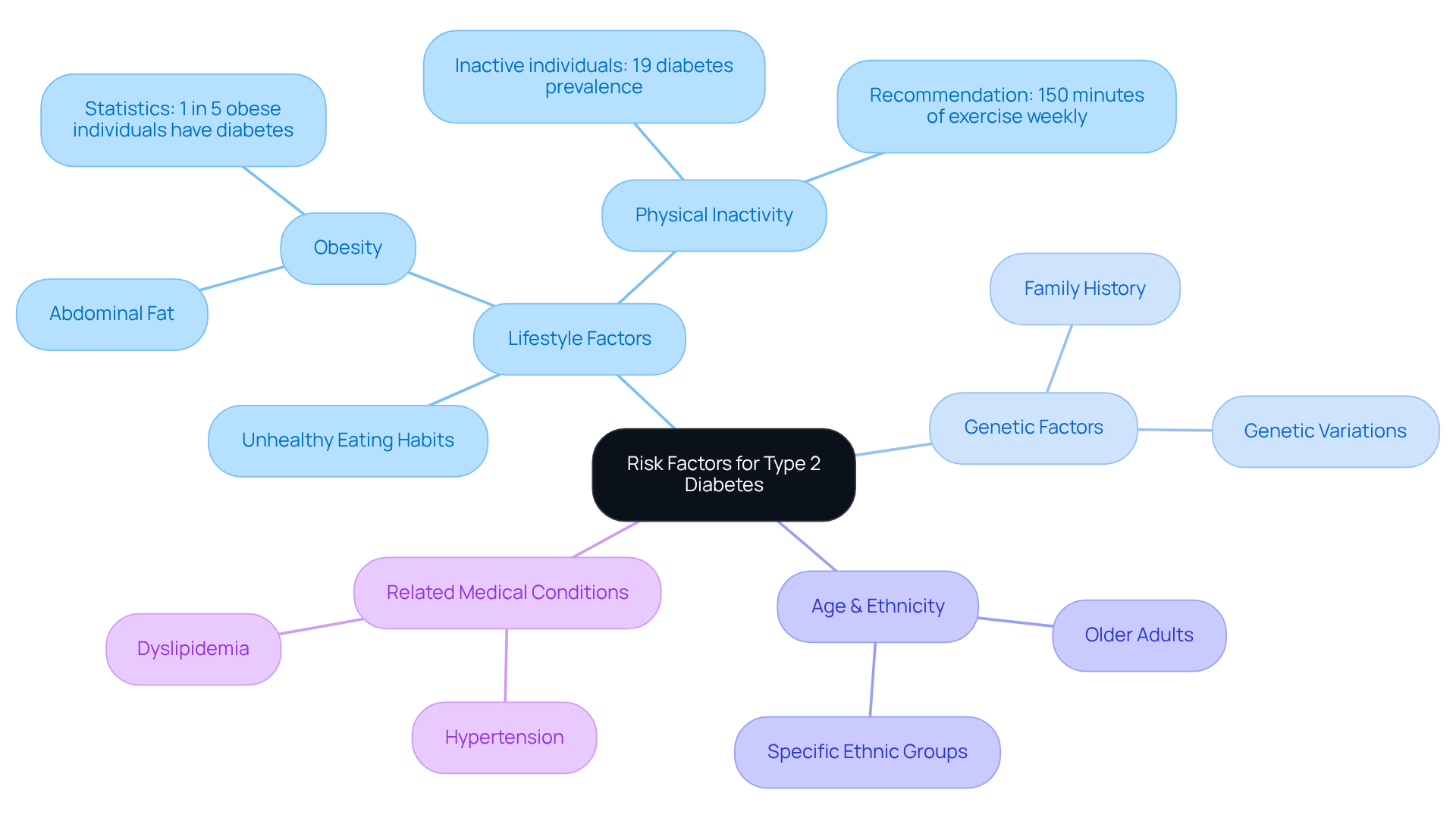Overview
Type 2 diabetes is a condition that can feel overwhelming, often stemming from insulin resistance and impaired insulin secretion. This results in elevated blood glucose levels, which can lead to long-term health complications. It's important to understand that both lifestyle factors, such as obesity and inactivity, and genetic predispositions play significant roles in the development of this condition. By recognizing these elements, we can better manage and prevent diabetes together.
You’re not alone in this journey. Many people face similar challenges, and understanding the factors involved can empower you. Lifestyle changes can be daunting, but they are achievable. Seeking support from healthcare professionals and connecting with others who share similar experiences can make a significant difference.
Remember, we are here to support you every step of the way. If you have questions or need resources, don’t hesitate to reach out. Together, we can navigate this path toward better health.
Introduction
Type 2 diabetes is more than just a health concern; it represents a complex interplay of biological and lifestyle factors that can significantly impact your life. As this disorder continues to rise globally, understanding its causes and consequences becomes crucial for effective management and prevention. It’s natural to wonder: what drives the body's resistance to insulin, and how can you navigate the many risk factors associated with this condition?
By delving into the biological mechanisms and lifestyle influences behind type 2 diabetes, you can uncover essential insights that empower you to take control of your health journey. Remember, you're not alone in this journey; there is support available to help you every step of the way. Together, we can explore the resources and strategies that will guide you toward a healthier future.
Define Type 2 Diabetes: Understanding the Disorder
Type 2 diabetes mellitus is a long-lasting metabolic condition that can feel overwhelming. It is marked by elevated blood glucose levels, which occur due to resistance to a hormone that regulates sugar, along with a relative shortage of that hormone. Unlike type 1 diabetes, where the body does not produce this hormone, individuals with type 2 can create it, but their bodies struggle to use it effectively. This condition often develops gradually, and it's understandable to feel concerned about the serious health complications that can arise if it is not managed properly.
Symptoms may include:
- Increased thirst
- Frequent urination
- Fatigue
- Blurred vision
Recognizing these signs is vital, as it helps you understand the impact of diabetes type 2 as a disorder on your life and the healthcare system as a whole. As T2DSolutions introduces itself as a new resource hub, it seeks to empower individuals like you with extensive education and community support for effectively managing type 2 and type 3 blood sugar conditions.
You're not alone in this journey. We are here to support you every step of the way. To stay informed about the latest resources and updates, consider subscribing to our newsletter. Together, we can navigate this path toward better health.

Examine the Biological Mechanisms Behind Type 2 Diabetes
Understanding that diabetes type 2 is a disorder can feel overwhelming, but you're not alone in this journey. Diabetes type 2 is a disorder that involves a combination of resistance to insulin and impaired secretion of this vital hormone. When the body's cells, particularly in muscle and fat tissues, do not respond effectively to insulin, it leads to increased blood glucose levels. Over time, the pancreas tries to compensate by producing more insulin, but eventually, it may struggle to meet the body's demands.
This struggle results in a state of hyperglycemia, which can cause damage to various organs and systems. It's important to recognize that factors such as inflammation, oxidative stress, and hormonal imbalances also play significant roles in the development and progression of diabetes type 2 as a disorder. Remember, understanding these factors is a crucial step toward managing your health.
If you're feeling uncertain or anxious about this diagnosis, know that support is available. We are here to guide you every step of the way. Seeking resources or connecting with others who share similar experiences can make a significant difference in your journey. You are not alone in this; together, we can navigate the challenges ahead.

Identify Risk Factors: Lifestyle and Genetic Influences on Type 2 Diabetes
The development of Type 2 Diabetes is influenced by a combination of lifestyle and genetic factors. It's important to recognize how our lifestyle choices—such as obesity, physical inactivity, and unhealthy eating habits—can significantly raise our vulnerability to this condition. For instance, excess body fat, particularly around the abdomen, is closely linked to insulin resistance, which is a key factor in the onset of diabetes. In 2022, statistics revealed that approximately one in five obese individuals reported having diabetes mellitus, highlighting the critical connection between weight and the likelihood of developing diabetes.
Genetics also plays a significant role in determining one's risk for Type 2 Diabetes. If you have a family history of diabetes type 2 as a disorder, your vulnerability may be increased, as certain genetic variations can predispose individuals to diabetes type 2 as a disorder. Alarmingly, studies indicate that about one in three American adults has prediabetes, which is a significant contributor to the development of Type 2 diabetes. This underscores the importance of genetic screening and awareness in managing your health.
Moreover, age and ethnicity further affect diabetes risk, with older adults and specific ethnic groups facing greater susceptibility. Additionally, medical conditions like hypertension and dyslipidemia can exacerbate this likelihood. Understanding these complex factors is essential for implementing effective prevention and management strategies, empowering you to take proactive steps in your health journey.
As Sulakshan Neupane wisely states, "Identifying these risk factors and acting to mitigate them is key." At T2DSolutions, we promote a holistic approach to diabetes management, offering resources such as personalized dietary plans, exercise programs, and mental health support. By fostering community engagement and providing educational materials, T2DSolutions aims to empower newly diagnosed patients like you in your journey toward better health. Remember, you're not alone in this journey—we are here to support you every step of the way.

Conclusion
Type 2 diabetes is a complex disorder that many people face, characterized by insulin resistance and impaired hormone secretion, which leads to elevated blood glucose levels. Understanding this condition is crucial, as it not only affects individuals but also poses significant challenges to our healthcare system. Recognizing the symptoms and biological mechanisms behind type 2 diabetes can empower you to take control of your health and seek the necessary support.
Throughout this article, we highlight the importance of awareness regarding the risk factors associated with type 2 diabetes, including lifestyle choices and genetic predispositions. It’s understandable to feel overwhelmed by the information, but knowing how obesity, physical inactivity, and certain medical conditions can increase vulnerability to this disorder is vital. Additionally, the role of community support and education, as provided by resources like T2DSolutions, is underscored as a key component in managing diabetes effectively.
Ultimately, understanding type 2 diabetes as a disorder is essential for fostering proactive health management. By acknowledging the interplay of biological, lifestyle, and genetic factors, you can make informed choices that promote better health outcomes. Engaging with available resources and connecting with others on similar journeys can significantly enhance the management of this condition, ensuring that you’re not alone in navigating this path. We are here to support you every step of the way.
Frequently Asked Questions
What is Type 2 diabetes?
Type 2 diabetes mellitus is a long-lasting metabolic condition characterized by elevated blood glucose levels due to resistance to insulin, along with a relative shortage of insulin. Unlike type 1 diabetes, individuals with type 2 can produce insulin but have difficulty using it effectively.
What are the symptoms of Type 2 diabetes?
Symptoms of Type 2 diabetes may include increased thirst, frequent urination, fatigue, and blurred vision.
How does Type 2 diabetes develop?
Type 2 diabetes often develops gradually, and it is important to recognize the signs early to manage the condition effectively and reduce the risk of serious health complications.
What resources does T2DSolutions provide for individuals with Type 2 diabetes?
T2DSolutions is a resource hub that aims to empower individuals with extensive education and community support for effectively managing Type 2 and Type 3 blood sugar conditions.
How can I stay informed about updates and resources related to Type 2 diabetes?
You can stay informed by subscribing to T2DSolutions' newsletter, which provides the latest resources and updates for managing Type 2 diabetes.



